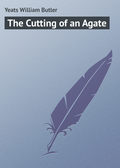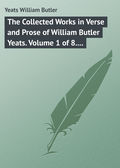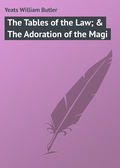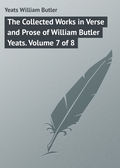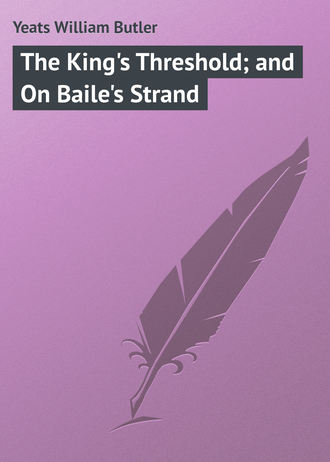
William Butler Yeats
The King's Threshold; and On Baile's Strand
Of your own town, and from your aged father.
Cian.
Run through it while I am getting out the food.
Mayor.
How was I to begin? What was the word
That was to keep it in my memory?
Wait, I have notched it on this Ogham stick.
“Chief poet,” “Ireland,” “Townsman”; that is it.
Chief poet of Ireland, when we heard that trouble
Had come between you and the King of Ireland
It plunged us in deep sorrow, part for you,
Our honoured townsman, part for our good town.
The King was said to be most friendly to us,
And we had reasons, as you’ll recollect,
For thinking that he was about to give
Those grazing lands inland we so much need,
Being pinched between the water and the rocks.
But now his friendliness being ill repaid
Will be turned from us and our town get nothing.
But there was something else – I’ll find the word
That was to keep it in my memory.
“Pride” – that’s the word, – we would not have you think,
Weighty as these considerations are,
That they have been as weighty in our minds
As our desire that one we take much pride in,
A man who has been an honour to our town,
Should live and prosper, therefore we beseech you
To give way in a matter of no moment,
A matter of mere sentiment, a trifle,
That we may always keep our pride in you.
Seanchan.
Their pride, their pride, what do they know of pride?
My pupils do not know it, for they beg
From the King’s favour what is theirs by right,
And how can men, that God has made so weak
They need a rich man’s favour every day,
Know anything of pride?
Cian.
[To Mayor.] You have spoken it wrongly.
You have forgotten something out of it about the cattle dying.
Mayor.
Maybe you do not know, being much away,
How many of our cattle died last winter
From lacking grass, and that there was much sickness
Because the poor had nothing but salt fish
To live upon. The people all came out
And stood about the doors as I went by.
Seanchan.
What would you have of me?
For there are men that shall be born at last
And find sweet nurture that they may have voices
Even in anger like the strings of harps.
Yet how could they be born to majesty
If I had never made the golden cradle?
Mayor.
What is it? “Father” – “Mother”; that is it;
Your father sends this message.
Cian.
He is listening.
Mayor.
He says that he is old and that he needs you,
And that the people will be pointing at him
And he not able to lift up his head
If you should turn the King’s favour away.
And he adds to it, that he cared you well,
And you in your young age, and that it’s right
That you should care him now.
Cian.
And when he spoke
He cried because the stiffness of his bones
Prevented him from coming.
Mayor.
But your mother
Has sent no message, for when they had told her
The way it is between you and the King
She said, “No message can do any good,
He will not send the answer that you want;
We cannot change him,” and she went indoors,
Lay down upon her bed and turned her face
Out of the light. And thereupon your father
Said, “Tell him how she is, and that she sends
No message.” I have nothing more to say.
Cian and Brian, you can set out the food.
[He sits down on steps. Seanchan is silent.
Mayor.
I have a horse waiting outside the town
To bring me home, and all the neighbours wait
Your answer. What answer am I to bring?
Seanchan.
Give them my answer – no, I have no answer:
My mother knew it.
Mayor.
Maybe you have forgotten
That all our fields are so heaped up with stones
That the goats famish, and the mowers mow
With knives, and that the King half promised us —
Seanchan.
Thrust that old cloak of yours into your mouth
Till it’s done gabbling.
Mayor.
But —
Cian.
You have said enough;
I knew that you would never speak it right.
Seanchan.
Our mothers know us, they know us to the bone,
They knew us before birth, and that is why
They know us even better than the sweethearts
Upon whose breasts we have lain.
Brian.
We have brought your honour
The food that you have always liked the best,
Young pigeons from Kinvara, and watercress
Out of the stream that’s by the blessed well,
And dulse from Duras. Here is the dulse, your honour,
It is wholesome, and has the good taste of the sea.
Seanchan.
O Brian, you would spread the table for me
As you would spread it when I was in my childhood;
But all that’s finished.
Mayor.
I knew he would not care
For country things now that he’s grown accustomed
To the King’s dishes. I told Brian too
He’d have his pains for nothing. But he’s old.
[Goes over to table at right. While he is speaking Cian and Brian are in vain offering Seanchan food.
And what dishes! Venison from Slieve Echtge
Fattened with poor men’s crops; flesh of wild pig;
Not fat nor lean, but streaky and right well cured;
Bread that’s the whitest that I’ve ever seen.
Cian.
You’re in the right, you’re in the right, he will not eat.
[Pouring wine into cup.
Mayor.
Bring him some wine, it will give him strength to eat.
[Brian brings wine over towards Seanchan.
No wonder if the King is proud and merry,
And keeps all day in the saddle, when even I
Am well-nigh drunken with the odour of it,
And if I dared – I dare not.
Cian.
Drink it, sir.
Brian.
Drink a few drops.
Seanchan.
Drink it yourself, old man,
For you have come a journey, and I daresay
You did not eat or drink upon the road.
Cian.
How can I drink it when your honour’s thirsty?
[He offers cup again. The King’s Household comes in. Chamberlain with long staff, a Soldier, a Monk, two Ladies, followed by Cripples who beg from the ladies, who keep close together at right, talking to each other at intervals. Soldier goes over to Mayor, and talks to him.
Chamberlain.
Well, have you it in imagination still
To overthrow the dignity of the King,
Or is the game finished?
[A pause.
How many days
Will you keep up this quarrel with the King,
With the King’s nobles and myself and all
Who’d gladly be your friends if you would let them?
Soldier.
[Who has been speaking to Mayor and Servants.]
Was it you that sent his servants and the Mayor
Of his own town to wheedle him into life?
Chamberlain.
It was the King himself.
Soldier.
Was it worth our while
To have got rid of him from the King’s table
If he is to be humoured and made much of?
Chamberlain.
It seems that he has not eaten yet, although
He’s had another dozen hours of hunger.
Soldier.
If he’s so proud and obstinate a neck
I’d let him starve.
Monk.
Persuade him to eat, my lord.
His death would make a scandal, and stir up
The common people.
Chamberlain.
And I have a fancy
That if it brought misfortune on the King,
Or the King’s house, we’d be as little thought of
As summer linen when the winter’s come.
Aileen.
[To Cian.] You’ve had no luck, old man.
Cian.
We have not, lady.
Aileen.
Maybe he’s out of humour with your ways,
Having grown used to sprightlier service.
Cian.
Maybe.
But the King’s messengers have gone for one
That will persuade him. [To Brian.] Come, let us go;
For she might lose her way in this fine place.
Come, we have been too long upon the tree,
[Plucking sleeve of Mayor.
And there are little golden pippins here.
Soldier.
Give me the dish, I’ll hand it him myself.
Aileen.
I wonder if she is pretty.
[Mayor and Servants have gone out.
Soldier.
Eat this, old hedgehog.
Sniff up the savour and unroll yourself.
But if I were the King I’d make you do it
With wisps of lighted straw.
Seanchan.
You have rightly named me,
I lie rolled up under the ragged thorns
That are upon the edge of those great waters
Where all things vanish away, and I have heard
Murmurs that are the ending of all sound.
I am out of life, I am rolled up, and yet,
Hedgehog although I am, I’ll not unroll
For you, King’s dog. Go to the King, your master,
Crouch down and wag your tail, for it may be
He has nothing now against you, and I think
The stripes of your last beating are all healed.
Chamberlain.
Don’t answer, you were never to his mind.
And now you have angered him to no good purpose.
But put the dish down and I will speak to him.
Seanchan.
You must needs keep your patience yet awhile,
For I have some few mouthfuls of sweet air
To swallow before I have grown to be as civil
As any other dust.
Chamberlain.
You wrong us, Seanchan,
There is none here but holds you in respect,
And if you would only eat out of this dish
The King would show how much he honours you.
Aileen.
[Giving Cripple money.]
You are always discontented. Look at this cripple,
He has had to cover up his eyes with rags
Because they are too weak to look at the sun,
And has a crooked body, and yet he is cheerful.
Stand there where he can see you.
[Cripple goes over and stands in front of Seanchan, bowing and smiling.
Chamberlain.
We have come to you
Because we wish you a long, prosperous life;
Who could imagine you’d so take to heart
Being put from the high table.
Seanchan.
It was not I
That you have driven away from the high table,
But the images of them that weave a dance,
By the four rivers in the mountain garden.
Monk.
He means we have driven poetry away.
Chamberlain.
It is the men who are learned in the laws,
Or have led the King’s armies that should sit
At the King’s table. Nor has poetry
Been altogether driven away, for I,
As you should know, have written poetry,
And often when the table has been cleared
And candles lighted, the King calls for me
And I repeat it him. My poetry
Is not to be compared with yours, but still
Where I am honoured, poetry is honoured
In some measure.
Seanchan.
If you are a poet,
Cry out that the King’s money would not buy,
Nor the high circle consecrate his head,
If poets had never christened gold, and even
The moon’s poor daughter, that most whey-faced metal,
Precious; and cry out that none alive
Would ride among the arrows with high heart
Or scatter with an open hand, had not
Our heady craft commended wasteful virtues.
And when that story’s finished, shake your coat
Where the little jewels gleam on it, and say
A herdsman sitting where the pigs had trampled
Made up a song about enchanted kings,
Who were so finely dressed one fancied them
All fiery, and women by the churn
And children by the hearth caught up the song
And murmured it until the tailors heard it.
Monk.
How proud these poets are! It was full time
To break their pride.
Seanchan.
And I would have you say
That when we are driven out we come again
Like a great wind that runs out of the waste
To blow the tables flat.
Chamberlain.
If you’d eat something
You’d find you have these thoughts because you are hungry.
Seanchan.
And when you have told them all these things, lie down
On this bare threshold and starve until the King
Restore to us the ancient right of the poets.
Aileen.
Let’s come away. There’s no use talking to him,
For he’s resolved to die, and that’s no loss:
We will go watch the hurley.
Monk.
You should obey
The King’s commandment and not question it,
For it is God himself who has made him king.
Essa.
Let’s hear his answer to the monk.
Seanchan.
Stoop down,
For there is something I would say to you.
Has that wild God of yours that was so wild
When you’d but lately taken the King’s pay,
Grown any tamer? He gave you all much trouble
Being so unruly and inconsiderate.
Aileen.
What does he mean?
Monk.
Let go my habit, Seanchan.
Seanchan.
Or it may be you have persuaded him
To chirp between two dishes when the King
Sits down to table.
Monk.
Let go my habit, sir.
What do I care about your insolent dreams.
Seanchan.
And maybe he has learnt to sing quite softly
Because loud singing would disturb the King
Who is sitting drowsily among his friends
After the table has been cleared —
Monk.
Let go.
[Seanchan has been dragged some feet, clinging to the Monk’s habit.
Seanchan.
Not yet; you did not think that hungry hands
Could be so strong. They are not civil yet —
I’d know if you have taught him to eat bread
From the King’s hand, and perch upon his finger.
I think he perches on the King’s strong hand,
But it may be that he is still too wild.
You must not weary in your work; a King
Is often weary and he needs a God
To be a comfort to him.
[The Monk plucks his habit away. Seanchan holds up his hand as if a bird perched upon it. He pretends to stroke the bird.
A little god,
With soft well-coloured feathers, and bright eyes.
Aileen.
We have listened long enough.
Essa.
Let us away,
Where we can watch the young men at the hurley.
Seanchan.
Yes, yes, go to the hurley, go to the hurley,
Go to the hurley, gather up your skirts,
Run quickly. You can remember many love songs;
I know it by the light that’s in your eyes,
But you’ll forget them. You’re fair to look on,
Your feet delight in dancing, and your mouths
In the slow smiling that awakens love.
The mothers that have borne you mated rightly,
For they had little ears as thirsty as are yours
For many love-songs. Go to the young men:
Are not the ruddy flesh and the thin flanks
And the broad shoulders worthy of desire?
Go from me. Here is nothing for your eyes,
But it is I that am singing you away,
Singing you to the young men.
[The two young Princesses Buan and Finnhua come in. While he has been speaking Aileen and Essa have shrunk back holding each others hands.
Aileen.
Be quiet;
Look who it is that has come out of the house.
Princesses, we are for the hurling field.
Will you come too?
Princess Buan.
We will go with you, Aileen,
But we must have some words with Seanchan,
For we have come to make him eat and drink.
Chamberlain.
I will hold out the dish and cup for him
While you are speaking to him of his folly,
If you desire it, Princess.
[He has taken up dish and cup.
Princess Buan.
Give me the cup.
My sister there will carry the dish of meat:
We’ll offer them ourselves.
Aileen.
They are so gracious,
The dear little princesses are so gracious.
[Princess Buan holds out her hand for Seanchan to kiss it; he does not move.
Although she is holding out her hand to him
He will not kiss it.
Princess Buan.
My father bids us say
That though he cannot have you at his table,
You may ask any other thing you like
And he will give it you. We carry you
A dish and a cup of wine, with our own hands,
To show in what great honour you are held.
Will you not drink a little? Does he not show
Every befitting honour to the poets?
Aileen.
O look, he has taken it, he has taken it!
The dear princesses, I have always said
That nobody could refuse them anything.
[Seanchan takes the cup in one hand, in the other he holds for a moment the hand of the Princess.
Seanchan.
O long soft fingers and pale finger-tips
Well worthy to be laid in a king’s hand;
O you have fair white hands, for it is certain
There is uncommon whiteness in these hands.
But there is something comes into my mind,
Princess. A little while before your birth
I saw your mother sitting by the road
In a high chair, and when a leper passed
She pointed him the way into the town,
And he lifted his hand and blessed her hand;
I saw it with my own eyes. Hold out your hands,
I will find out if they are contaminated;
For it has come into my thoughts that may be
The King has sent me food and drink by hands



